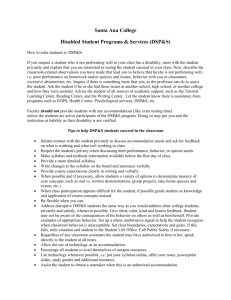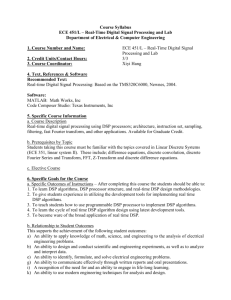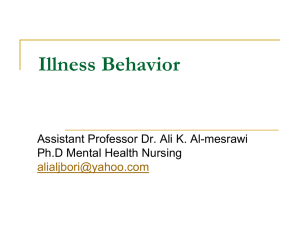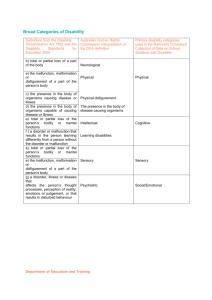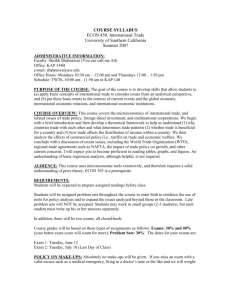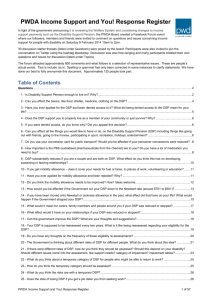Edward Wilson (Word 22 KB)
advertisement
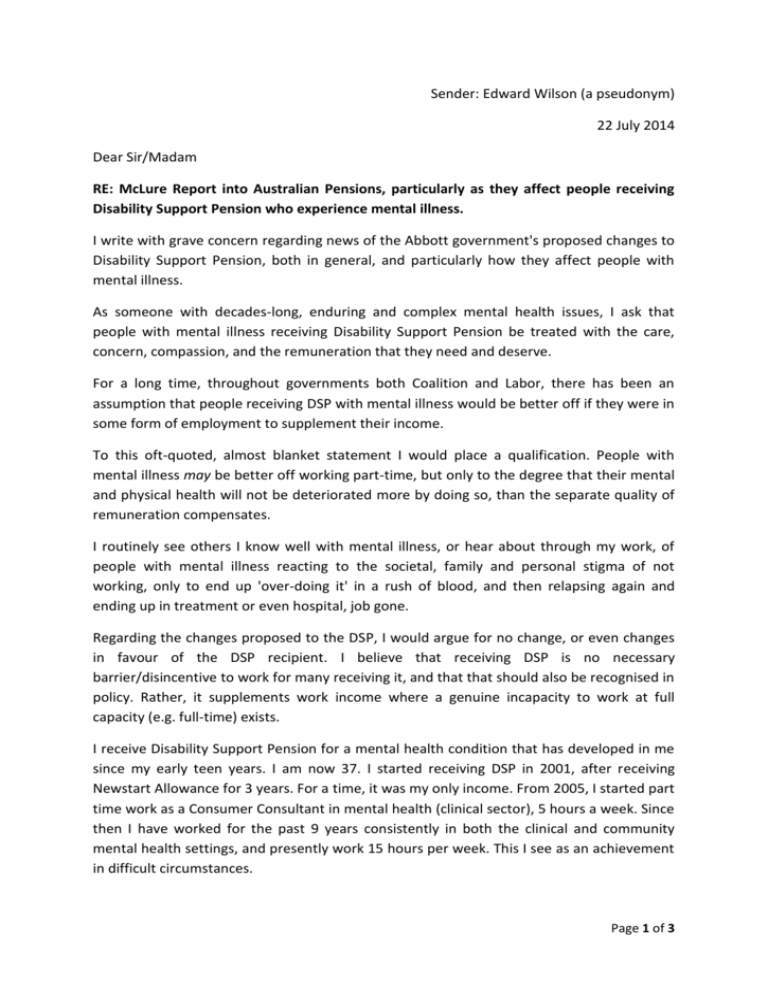
Sender: Edward Wilson (a pseudonym) 22 July 2014 Dear Sir/Madam RE: McLure Report into Australian Pensions, particularly as they affect people receiving Disability Support Pension who experience mental illness. I write with grave concern regarding news of the Abbott government's proposed changes to Disability Support Pension, both in general, and particularly how they affect people with mental illness. As someone with decades-long, enduring and complex mental health issues, I ask that people with mental illness receiving Disability Support Pension be treated with the care, concern, compassion, and the remuneration that they need and deserve. For a long time, throughout governments both Coalition and Labor, there has been an assumption that people receiving DSP with mental illness would be better off if they were in some form of employment to supplement their income. To this oft-quoted, almost blanket statement I would place a qualification. People with mental illness may be better off working part-time, but only to the degree that their mental and physical health will not be deteriorated more by doing so, than the separate quality of remuneration compensates. I routinely see others I know well with mental illness, or hear about through my work, of people with mental illness reacting to the societal, family and personal stigma of not working, only to end up 'over-doing it' in a rush of blood, and then relapsing again and ending up in treatment or even hospital, job gone. Regarding the changes proposed to the DSP, I would argue for no change, or even changes in favour of the DSP recipient. I believe that receiving DSP is no necessary barrier/disincentive to work for many receiving it, and that that should also be recognised in policy. Rather, it supplements work income where a genuine incapacity to work at full capacity (e.g. full-time) exists. I receive Disability Support Pension for a mental health condition that has developed in me since my early teen years. I am now 37. I started receiving DSP in 2001, after receiving Newstart Allowance for 3 years. For a time, it was my only income. From 2005, I started part time work as a Consumer Consultant in mental health (clinical sector), 5 hours a week. Since then I have worked for the past 9 years consistently in both the clinical and community mental health settings, and presently work 15 hours per week. This I see as an achievement in difficult circumstances. Page 1 of 3 I suffer from Schizo-affective Disorder (a thought, mood and anxiety condition that could be placed diagnostically between Schizophrenia and Bipolar Affective Disorder) Obsessive Compulsive Disorder (a repetitive thought and action disorder, influenced by anxiety) Delayed Sleep Phase Syndrome (a medical condition which makes it difficult to get up for work on time, and affects morning functioning) Polydipsia and Polyuria, medical conditions which mean that I must drink a large ongoing amount of water or fluid, and consequently need to go to the toilet much more often than usual. This also disrupts sleeping at night Persistent high anxiety and stress, inability to cope with stressful situations, a tendency to become overwhelmed easily, and great trouble in making decisions The side effects of medication, which include sedation, headaches, slowed motor functions and more A broad suite of several other psychological disorders/problems, which for many years I have been engaged in ongoing treatment and therapy As I am in a couple relationship, and do not receive rent assistance, I receive from Centrelink for DSP and related smaller payments (Pension supplement and Clean Energy Allowance), just $127 per fortnight. This is only working 15.2 hours per week, which I see as being at the top level of my capacity. It is also over my 'benchmark' assessed hours, which are as seen as 10-15 per week. Granted, this is not much money, but I see it as money which is highly valued. It is an integral part of the household income. To lose or see this value depreciated would be a serious loss for both me and my partner. It would also place a high degree of relationship stress on our partnership, which, as she also has low prevalence mental illness (Bipolar Affective Disorder [Manic Depression] and Generalised Anxiety Disorder), is well high enough already. Two people, both with lower-prevalence conditions like ours, in a couple relationship, and both with high anxiety and stress levels in home and out, does not bode for an easy relationship. This definitely decreases both my and her levels of mental health, and increases constant arguments and disharmony. To cut or eliminate my ability to receive DSP, would further exacerbate an already highly difficult situation, and place huge stress on me, who is not in a position to cope with it. My partner does not qualify for DSP, although has in the last year received a part Newstart allowance (miniscule) with her part-time wage, also in mental health with a client liaison role. She no longer qualifies for even this. Page 2 of 3 Ideally I would like to be free of DSP and all its stigma and problems bureaucratically, though realistically I realise that I need it. I also desperately need (and so does my partner) the Pensioner Concession Card which enables me to receive some discounts, especially on psychiatric medication. We both take multiple prescriptions of psychiatric and other medication. I passionately ask the Pensions review committee to consider the needs of people with mental illness receiving DSP. I ask them to consider our ongoing and turbulent difficulties, even with things ‘as they are’. I argue against any further scrutiny of recipients, and ask that those that do receive the payment, can relax and not worry themselves to sleep each night (as I do), as to whether they will continue to receive it in the future. I also passionately argue against reducing the rate of DSP for anyone, including those with some working capacity. Some of those on the payment with some working capacity are working to that capacity, and do not deserve their supplementary income to be diminished. We are already doing the right thing, and working at or over our sensible capacities. We are doing what we can! I did not ask, or want, to suffer from enduring, essentially lifelong mental illness, causing disability. It has changed my entire life, as I once envisaged it. But having endured this, a compassionate government would seek to supply those needing it with a supplementary payment, which definitely - with personal advocacy - improves and enhances our way of life, and leads to greater social inclusion, respect, and dignity. Yours Sincerely, Edward Wilson South-Eastern suburbs Melbourne, Victoria. Note: my real name is confidential. The name supplied here is a pseudonym. Page 3 of 3

